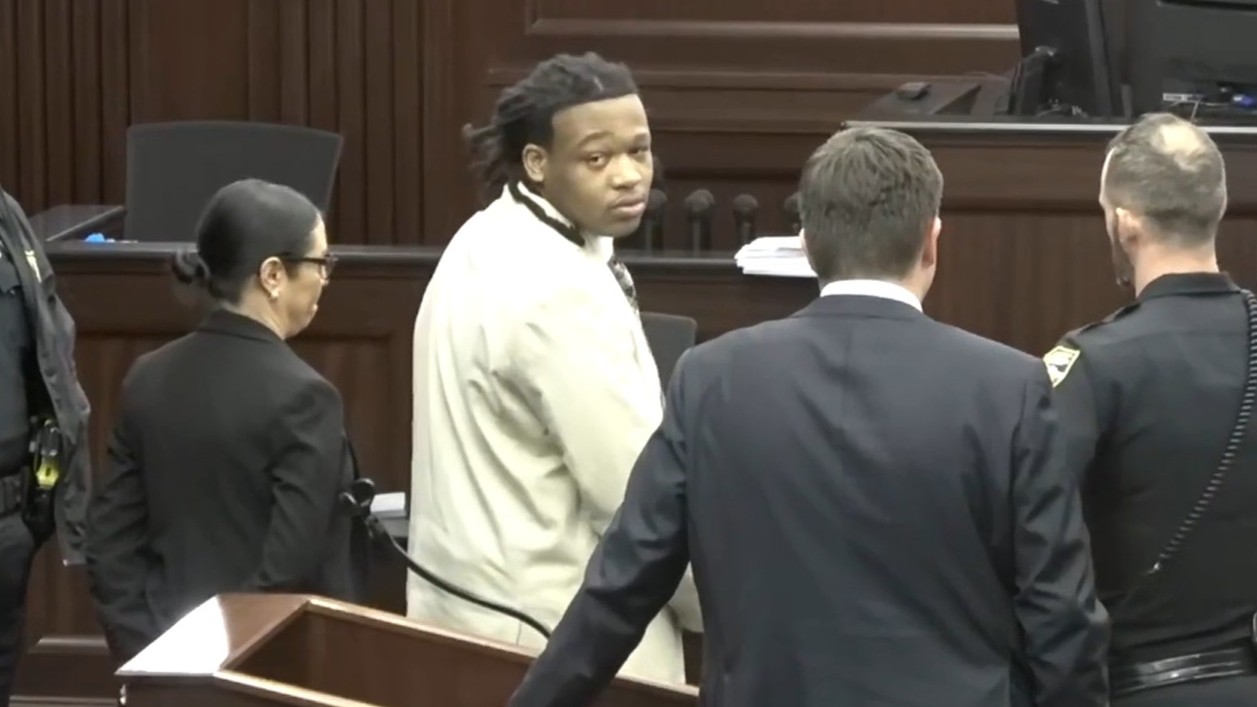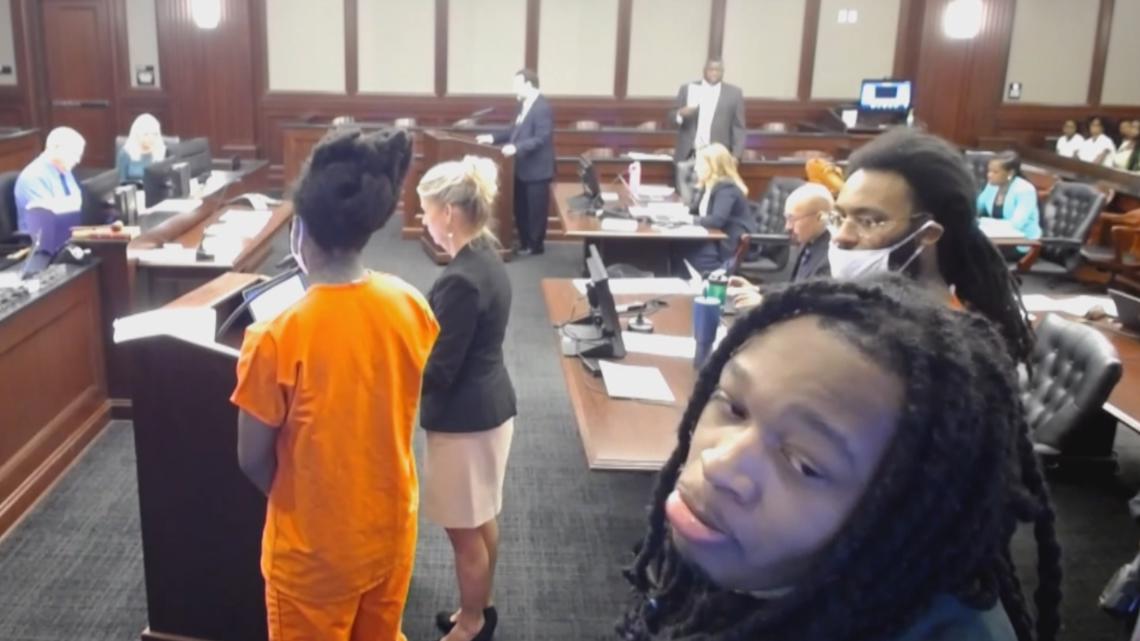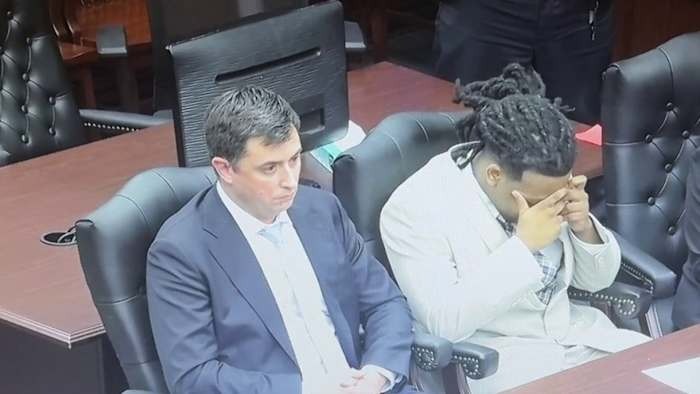JACKSONVILLE, Fla. — In a major legal development that drew national attention, Jacksonville rapper Hakeem Robinson, known by his stage name “Ksoo,” was found guilty of first-degree murder for his involvement in the January 15, 2020, shooting death of Charles McCormick Jr., also known as “Lil Buck.” Robinson’s cousin, Leroy Whitaker Jr., was also convicted of first-degree murder and burglary related to the same incident.
Both verdicts were reached on July 25, 2025, following extensive jury deliberations and nearly two weeks of testimony that featured key witnesses, digital forensic evidence, and law enforcement accounts.

Jury Deliberation and Verdict
The case involved two separate juries—one for each defendant. Whitaker’s jury deliberated for just under two hours, while Robinson’s jury, composed of 12 individuals, spent nearly four hours reviewing the case before delivering the verdict. Both defendants declined to testify during the trial.
Florida State Attorney Melissa Nelson released a statement following the verdict, acknowledging the efforts of law enforcement and the prosecution team in holding the defendants accountable for what she described as a calculated and violent crime committed in broad daylight.
Case Background and Investigation
The Jacksonville Sheriff’s Office (JSO), along with the State Attorney’s Office, led the investigation. According to authorities, the fatal shooting took place outside a staffing agency at Dames Pointe Plaza. Surveillance footage, witness testimony, and digital forensics were key components in identifying the suspects.
Lead investigator Sgt. Christopher Smith testified that multiple pieces of evidence—including surveillance video, dashcam footage, cellphone records, and social media activity—linked Robinson, Whitaker, and Dominique Barner to the crime. Although the firearm used in the shooting was never recovered, shell casings, a stolen vehicle, and DNA evidence from a subsequent home invasion were presented in court.
Testimonies from Key Witnesses
One of the most critical testimonies came from Dominique Barner, who admitted to driving the stolen car involved in the crime and was offered a plea deal in exchange for his cooperation. Barner testified that the motive for the shooting stemmed from a rap track released by McCormick that referenced a relative of Robinson. Prosecutors alleged that the song offended Robinson and served as a catalyst for the attack.
Barner described how he, Robinson, Whitaker, and Abdul Robinson Jr. (Hakeem Robinson’s brother) surveilled McCormick’s residence and later followed him to the staffing agency. He claimed that Robinson exited the vehicle and pursued McCormick on foot before firing multiple shots, resulting in McCormick’s death.
Another significant testimony came from Hakeem Robinson’s father, Abdul Robinson Sr., who also faces charges in connection with the aftermath of the incident. He testified under oath that his sons, Hakeem and Abdul Jr., were angered by the song and had expressed intentions to retaliate. When shown surveillance video during the trial, Robinson Sr. identified the shooter as his son, Hakeem.
Physical Evidence and Forensics
Authorities presented various forensic elements during the trial. A latent fingerprint examiner testified that Robinson’s fingerprint was found on a firearm slide recovered from the stolen vehicle used during the shooting. However, the examiner could not determine when the print was left.
An FBI cellular data expert explained how cellphone tower data can provide general locations of mobile devices. Still, the expert stated that Robinson’s phone could not be definitively placed at the scene of the shooting.
Additionally, a certified forensic video examiner reviewed dashcam footage and conducted a comparative analysis using 3D models of the suspects. The findings excluded Barner and Whitaker as potential shooters based on size and movement patterns, but could not definitively exclude Robinson.
Defense Arguments and Counterpoints
Robinson’s legal team, led by attorney Christopher Decoste, challenged the credibility of the state’s witnesses, including Barner and Robinson Sr. The defense argued that discrepancies in height descriptions of the shooter—initially estimated between 5’8″ and 5’9″ by witnesses—did not match Robinson’s reported height of 6’3″.
Defense attorneys also scrutinized the use of drill rap lyrics and social media posts as evidence, suggesting that the prosecution may have misinterpreted artistic expression as criminal intent. They contended that similar lyrics from the victim had not been scrutinized in the same manner.
The defense further pointed to inconsistencies in eyewitness accounts, including the fact that no one at the scene could positively identify Robinson as the shooter, given the use of a mask and the chaotic nature of the event.
Additional Testimonies and Incidents
A woman who worked at the staffing agency testified that she witnessed the shooter approaching McCormick before gunfire erupted. She described the shooter as wearing a black mask and skull cap. Her 911 call, played in court, captured the immediate aftermath of the shooting.
Another witness, a woman who was a victim of a home invasion on the same day, testified that two men, including Barner, entered her home while fleeing from police. She identified Barner through a tattoo and stated that the other suspect wore a mask and was never clearly identified.
In a separate incident during the trial, a family member of Robinson was banned from the courtroom for live-streaming witness testimony, violating court protocol and the rights of a protected witness.

Looking Ahead
This trial is one of several legal proceedings involving members of the group ATK. Hakeem Robinson is also scheduled to stand trial for a separate murder charge in the 2019 death of 16-year-old Adrian Gainer Jr., known as “Lil Bibby.”
The outcomes of these high-profile trials have sparked broader conversations in Jacksonville about the intersection of music, public safety, and youth violence. Prosecutors emphasized the need for distinguishing entertainment from criminal behavior, while defense teams urged caution in interpreting rap lyrics and digital content as evidence of guilt.
Conclusion
The convictions of Hakeem Robinson and Leroy Whitaker Jr. in the murder of Charles McCormick Jr. mark a significant milestone in a complex and closely watched case. The legal process included detailed forensic analysis, emotional family testimonies, and debates surrounding music and criminal intent. As the legal proceedings continue, the community remains attentive to the broader implications surrounding the case.


